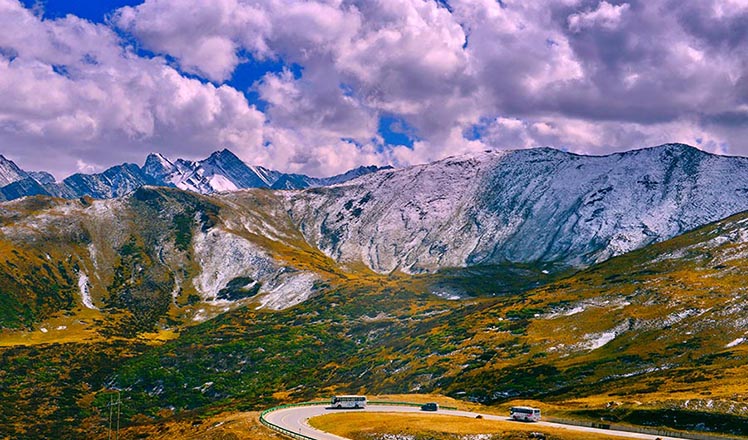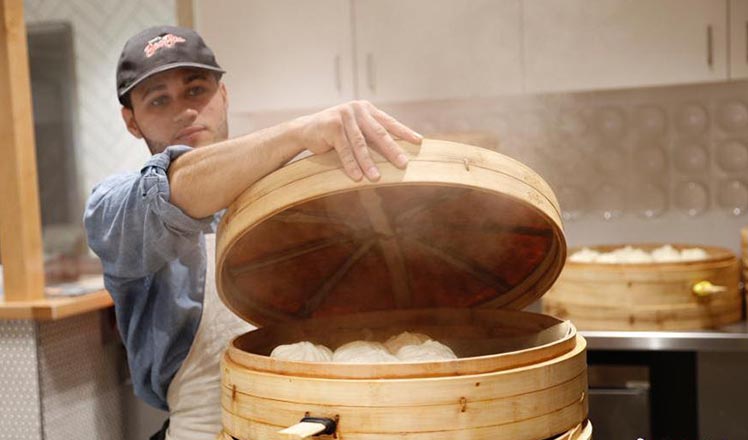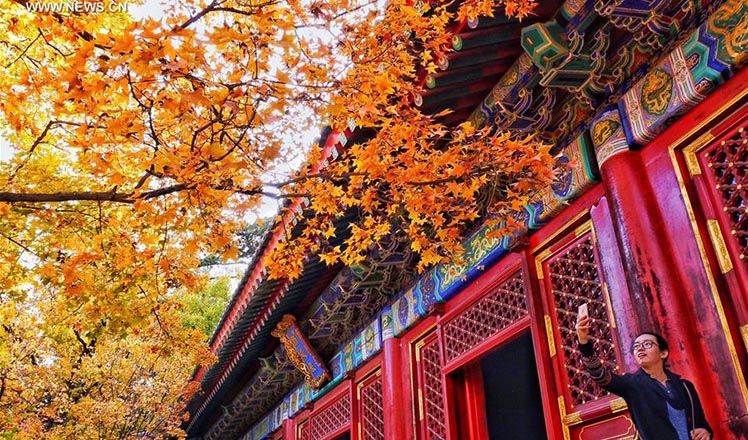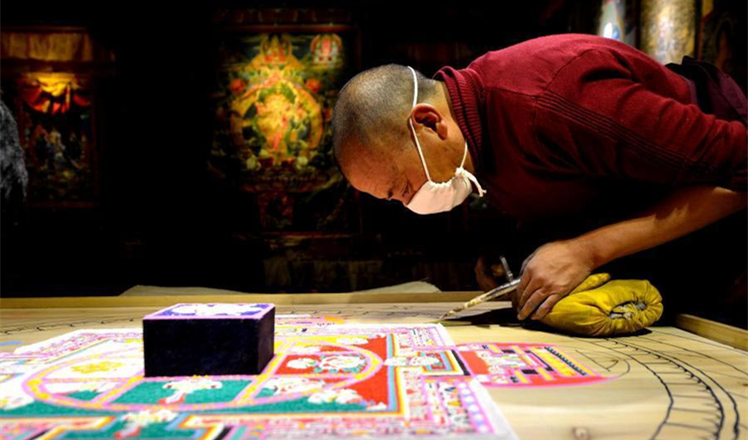Chinese groups, First Nations relate
Updated: 2016-10-28 03:42
By NA LI in TORONTO(China Daily Canada)
|
||||||||
|
Members of the Aboriginal Education Center at St. Paul’s College play a traditional song of the First Nations on Oct 3 in Waterloo. JIAO HUANWEN / FOR CHINA DAILY |
Chinese groups listened with an understanding forged by experience about the challenges faced by Canada’s First Nations’ aboriginal groups.
A symposium, Shared Cultural Pasts: A Comparative Conversation Exploring the Cultures of Multi-ethnic Chinese and First Nations Peoples in Canada, was held in Waterloo earlier this month.
|
Father Norman Casey (back row, fourth from right) is joined by Chinese ethnic minority scholars and writers at St. Paul’s Church at Six Nations of the Grand River in Ohsweken on Oct 3. XIN LIANXING / FOR CHINA DAILY |
Hosted by the Confucius Institute in Waterloo and the Institute of Ethnic Literature at the Chinese Academy of Social Sciences, it gathered 18 Chinese ethnic minority scholars and writers along with their North American counterparts to engage in dialogues of comparative multiculturalism in Canada and China.
Guo Xuebo, a novelist born in Inner Mongolia, discussed similarities in religious practices between Mongolians and the First Nations.
|
Yan Li (right), a bilingual writer and director of the Confucius Institute in Waterloo, presents a painting to Lila Bruyere (centre) and her son, Shawn Johnston, from the Waterloo Aboriginal Education Centre after they spoke at an international symposium on Oct 2 in Waterloo. NA LI / CHINA DAILY |
The First Nations comprise the various aboriginal Canadians, of which there are currently 634 groups across the country.
"I discovered that the religious beliefs of these people, including their customs and attitudes toward nature were similar to that of the Mongolian people, and this made me feel connected to these people," Guo said.
Guo said that since the ancient Pleistocene glacial period, when the sea level fell, the Bering Strait exposed a narrow strip of land, which the ancestors of the Inuit crossed. Some of the first Canadians crossed the strait that connected Asia to North America.
|
Darrol Bryant, director of the Centre for Dialogue and Spirituality in the World’s Religions at Renison, which hosted the 2016 international symposium from Oct 1-2 in Waterloo, said that Canadians can learn from China in cooperating with multiethnic groups. NA LI / CHINA DAILY |
"In particularly, I found that the Inuit religion appellation is called ‘Shamanism’, which is exactly the same as Mongolian Shamanism," Guo said.
Guo’s Mongolian group is just one of the 55 ethnic minority groups in China, in addition to the Han majority. All of the groups have traditions of written and oral literature.
"Ethnic minority literature came into a new era since the founding of a new China in 1949," said Yin Hanyin, a Manchu ethnic writer, who was the editor of National Literature magazine.
Chinese ethnic minority literature began to flourish after the open-door policy was adopted, Yin said. In recent years, more ethnic writers have begun writing in their native languages.
"The Chinese government has paid great attention to promote the ethnic minority literatures, because many minority writers are at the same time inheritors of their cultures," said Pan Ling, a Bu Yi ethnic writer, who is deputy general of the Chinese Minority Writers Society.
"The multicultural nationalities in China have functioned primarily toward providing resources to maintain the vitality of the mainstream Han culture throughout China’s long history," said Yan Li, director of the Confucius Institute in Waterloo. "In the past years, these multicultural nationalities have demonstrated their vision for preserving their worthwhile heritages, which the majority-group people should learn from."
The conversation exploring the cultural of multinational Chinese and First Nations people of Canada is an important one, said Darrol Bryant, director of the Centre for Dialogue and Spirituality in the World’s Religions at Renison University College in Waterloo.
"North America is a relatively new nation, and it began its history by colonizing the indigenous people of the Americas, and that has had disastrous consequences for the indigenous peoples of the Americas," Bryant said.
"China, on the other hand, has had thousands of years to deal with their multiethnic heritage. I think actually there are things as Canadians to learn from the current situation in China," he said.
"There are a lot of interesting possibilities for comparative or cooperative education with students from China and Canada, to learn the tragic history and the consequences," said Keith Carlson, a history professor at the University of Saskatchewan.
At the symposium, Lila Bruyere recalled her experience of being deprived of using her native language.
As a second-generation "survivor "of Canada's residential school system, Bruyere was taken away from her home community of Couchiching First Nation in northern Ontario at age 6 and spent eight years at what she called a "feared" building that now houses the Aboriginal and First Nations’ offices.
Residential schools were set up to assimilate aboriginal children into Canadian culture.
"I was told not to speak my own language, because our language is bad," she said with a quaver in her voice. "So I missed out on my language, but I think my language is still here, in my heart."
Bruyere was accompanied by her son, Shawn Johnston. The cycle started from her parents and continued to her son, she said.
Bruyere said the trauma has affected so many aboriginal families like hers.
"I wanted the cycle of abandonment to stop; I started my own healing and kept myself in treatment."
Despite those obstacles, Bruyere and Johnston graduated from the Wilfrid Laurier University’s Master of Social Work Aboriginal Field of Study program, and mother and son donned graduation robes at the same time.
Bruyere’s and her son’s stories are some of the wrenching tales that residential school survivors have shared since the notorious system was closed in the 1980s after almost 100 years in operation.
"The loss of language and culture is the loss of worlds as we know them," Wendy L. Fletcher, principal and vice-chancellor at Renison University College, said at the symposium.
"The recovery of traditional wisdoms and practices as well as recovery of language will be critical in formulating a new Canada." Wendy added.
renali@chinadailyusa.com
- Hefty award offered for deciphering oracle bone characters
- China Daily brings you 'sixth plenums' in past 35 years
- Party ramps up supervision
- 400,000 migrant workers flock to Xinjiang to harvest cotton
- China anticipates booming job market in 2016
- Online shopping platform selects cat as 'chief cute officer'
- Asia American leaders discuss civic engagement
- World's disabled get new champion
- Clinton, Michelle Obama make first joint campaign appearance
- Miss Philippines wins 2016 Miss International Beauty Pageant
- Trump's Hollywood Walk of Fame star destroyed
- Maduro activates Defense Council to seek solution to crisis

 2016 Comedy Wildlife Photography Awards Finalists
2016 Comedy Wildlife Photography Awards Finalists
 NINED VR creates splash with virtual reality products
NINED VR creates splash with virtual reality products
 Splendid Sichuan captured in photos
Splendid Sichuan captured in photos
 Chinese baozi shop gains popularity in Harvard Square
Chinese baozi shop gains popularity in Harvard Square
 Chinese mariner on record-breaking voyage goes missing
Chinese mariner on record-breaking voyage goes missing
 2045-square-meter photo mosaic breaks world record
2045-square-meter photo mosaic breaks world record
 Red leaves reveal beauty of autumn
Red leaves reveal beauty of autumn
 Tibet mandala: The world in a grain of sand
Tibet mandala: The world in a grain of sand
Most Viewed
Editor's Picks

|

|

|

|

|

|
Today's Top News
'Zero Hunger Run' held in Rome
Trump outlines anti-terror plan, proposing extreme vetting for immigrants
Phelps puts spotlight on cupping
US launches airstrikes against IS targets in Libya's Sirte
Ministry slams US-Korean THAAD deployment
Two police officers shot at protest in Dallas
Abe's blame game reveals his policies failing to get results
Ending wildlife trafficking must be policy priority in Asia
US Weekly

|

|








